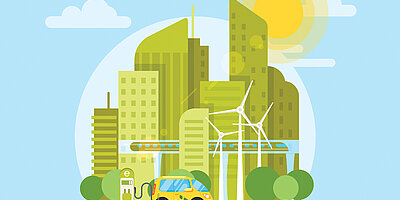On behalf of the Climate and Energy Fund, the ITA is further developing a model that enables a detail-oriented assessment of the maturity of innovations for climate-neutral cities.

We drive a green-powered car, live in an energy efficient building or heat with a heat pump – wherever energy is used, we currently witness a life-changing transition: In order to slow down climate change, wide-spread efforts are being made to end dependence on coal, gas and oil. Policy-makers and businesses expect positive economic effects, such as the creation of new jobs, new markets and new industrial sectors.
Austria has set ambitious climate targets for itself: the emission of greenhouse gases is to be reduced by 36 percent by 2030 and renewable energies are to almost completely replace fossil fuels by 2050. These numbers are deduced from the climate targets of the European Council. Money factors into this equation: if Austria misses its climate targets, it will have to purchase emission rights worth billions from the EU.
This development will give room to new products and new businesses, new photovoltaic, wind and hydroelectric power plants will be built. For such a far-reaching turnaround to succeed, everyone must participate. Not only big consumers are called upon to change their energy behaviour. Citizens also have an active role to play as consumers, voters and energy producers. They are expected to learn to deal with these new technologies and even to produce their own energy.
Thousands of new jobs – for example through the expansion and modernisation of the electricity networks, in the supply industry (e.g. electric vehicles) or in the construction industry (e.g. plus-energy buildings, solar cooling, etc.) – could follow. In addition to economic growth, efficient technologies and new processes can also reduce the high energy consumption in industry.
The way we generate and consume energy will become more flexible. Smart grids are regarded as the central infrastructure for a future energy system. In addition to the big energy producers, there will also be many small, decentralised producers who will feed their electricity into the grid. The amount of available electricity will literally depend on the weather when it comes to wind, water and solar energy. This means that weather data will also play a greater role in estimating the supply of energy. Energy will then be used or stored directly by consumers when it is abundant. E-cars, for example, do not necessarily have to be recharged at all times; they could also be connected to the grid overnight and then again recharged if there is a sufficient supply of green electricity.
The ITA project MATCH looked at which smart grid technologies are already in use in Austria, Norway and Denmark and how they have proven to be valuable: The main outcome was that communication and a regular exchange with the local consumers is essential. However, solutions that work well in one geographic area cannot necessarily be transferred to the entire energy system. It is therefore important to examine the different impacts of locally successful solutions on existing national energy systems.
The building sector has also turned into a major contributor to energy efficiency. Austria is a pioneer in passive houses in Europe. For example, the ITA has assisted the Lower Austrian municipality of Korneuburg in the energy-efficient renovation of two residential buildings. In office buildings, too, an enormous amount of energy can be saved and at the same time the indoor quality at the workplace can be improved. The ITA examined the satisfaction of employees in the EnergyBase, Vienna's first "green" office building.
Electromobility: In Austria, diesel still remains the most sought after fuel source for cars. This can change quickly, however, as international companies recognize that time is running out. More and more brands are increasingly relying on battery-powered vehicles. This requires a new infrastructure and new business models. The ITA was investigating the switch to electric cars for vehicle fleets in Vienna. Company fleets are regarded as an attractive entry market for alternative drive systems.
The energy revolution raises a number of questions. What are the pros and cons of the new technical possibilities? Do they live up to expectations? How can all these new technologies be explained without overwhelming the consumers? Also, there are new risks: Is the data collected about our energy consumption sufficiently protected? Are the new digital infrastructures secure and stable enough?
The ITA deals with the transformation of our energy system with the aim of identifying the desired and undesired consequences early on and contributing to a successful development process.